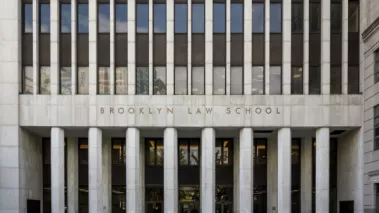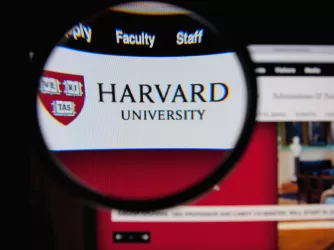Table of Contents
FAN 204 Brooklyn Law School to Host Symposium: Incitement at 100—and 50—and Today: Free Speech and Violence in the Modern World

Editorial credit: Thitsanu Angkapunyadech / Shutterstock.com
About the Symposium
This year marks the centennial of the first Supreme Court cases to give serious consideration to free speech, decided in response to convictions of dissenters who opposed American participation in World War I and allegedly incited interference with the war effort. By coincidence, 2019 also marks the 50th anniversary of Brandenburg v. Ohio, the 1969 case that established the modern rule for when political speech can be suppressed for inciting lawless action and, conversely, when it is constitutionally protected.
This Brooklyn Law Review symposium brings together noted free speech scholars and practitioners to consider the history of the incitement cases, their relevance today in a world of social media and terrorism anxiety, and their enduring importance. The panels in this day-long event will span the time horizon from 1919 to 2019 and beyond…
- Date: Friday, April 12, 2019
- Time: 8:30 a.m.–4:15 p.m.
- Location: Brooklyn Law School, Subotnick Center, 250 Joralemon St., Brooklyn, NY
Participants
- Floyd Abrams, Cahill Gordon & Reindel LLP
- William D. Araiza, Brooklyn Law School
- Jonathan Askin, Brooklyn Law School
- Christopher Beauchamp, Brooklyn Law School
- Ronald Collins, History Book Festival; former Harold Shefelman Scholar, University of Washington Law School
- Leslie Gielow Jacobs, University of the Pacific McGeorge School of Law
- Joel M. Gora, Brooklyn Law School
- David S. Han, Pepperdine University School of Law
- Thomas Healy, Seton Hall University School of Law
- Leslie Kendrick, University of Virginia School of Law
- Heidi Kitrosser, University of Minnesota Law School
- Genevieve Lakier, University of Chicago Law School
- Louis Michael Seidman, Georgetown Law
- Nadine Strossen, New York Law School
- Emerson J. Sykes, ACLU Speech, Privacy, and Technology Project
- Rachel E. VanLandingham, Southwestern Law School
- Christina E. Wells, University of Missouri School of Law
→ For general inquiries regarding this event, please contact the BLS Office of Events at events@brooklaw.edu or (718) 780-7966.
Abrams Institute Files Amicus Brief in Gerrymandering Case
The Floyd Abrams Institute for Freedom of Expression recently filed an amicus brief in Rucho v. Common Cause. Mr. Abrams is the counsel of record and is joined by Francesca Procaccini, David Schulz, Charles Sims, and the Media Freedom and Information Access Clinic at Yale Law School. The main arguments raised in the brief are:
- Partisan Gerrymandering Violates The First Amendment’s Protection of Freedom of Speech
- Voting Is Core Political Speech
- Partisan Gerrymandering is Viewpoint Discrimination
- Partisan Gerrymandering Does Not Survive Strict Scrutiny
- First Amendment Scrutiny Offers the Appropriate Framework for Determining the Constitutionality of Partisan Gerrymandering
- Settled First Amendment Doctrine Provides A Workable Standard For Legislatures And Courts
- The Historical Practice of Partisan Gerrymandering Does Not Shield it From First Amendment Scrutiny
Related

Qualifying for Reporter’s Privilege in the Digital Age
- Isabel Farhi, A Reporter by Any Other Name: Qualifying for Reporter’s Privilege in the Digital Age, MFIA (Feb. 27, 2019)
Inside Higher Ed: "A Free Speech Purist [Geoffrey Stone] Opts Not to Use the N-Word"
Geoffrey Stone, Edward H. Levi Distinguished Service Professor of Law at Chicago, is something of a free speech purist. He chaired the committee that wrote the much-emulatedChicago statement on campus speech, for example, and he’s not afraid to make students uncomfortable if it helps them learn.
Until this week, that included saying the N-word in during a First Amendment law lecture he often gives on the fighting-words doctrine. That’s the legal line between free speech and words that would incite immediate violence or retaliation. Stone has previously argued that saying the N-word to illustrate it is useful.
This week, however, after meeting with a group of students who were hurt by his recent use of the word, Stone said that he won’t say it anymore.
"This is really important — this is not about censorship, or about anybody telling me what to do or not to do,” he said. “This is something on which students have enlightened me. And that’s great."
Related
- David Raban, Racism Thrives at the Law School, The Chicago Maroon (March 5, 2019)
On Wednesday, March 6, Professor Geoffrey Stone began Constitutional Law II: Freedom of Speech with a promise to never again use the story described below as an in-class pedagogical lesson. In his decision, he cited the voices of Black law students at the University of Chicago Law School who spoke with him earlier that day.
On Wednesday, January 23, 2019, University of Chicago Law School Professor Geoffrey Stone personally and purposefully spoke the full N-word in the classroom. The following op-ed contextualizes this incident and calls for action.
Robson on Ohio's Ban on Funding Planned Parenthood
- Ruthann Robson, Sixth Circuit En Banc Majority Upholds Ohio's Ban on Funding Planned Parenthood, Constitutional Law Prof Blog (March 12, 2019)
Shapiro & Finch on Edgy Rap Lyrics
- Ilya Shapiro & Michael Finch, Edgy Rap Lyrics Shouldn’t Land a Man in Jail, Cato at Liberty (March 7, 2019)
Lawrence Ferlinghetti: An American Maverick
- Collins & Skover on the publisher and bookseller criminally tried for selling Allen Ginsberg's poem HOWL, Publishers Weekly (March 11, 2019)
Related
- Jackie Farmer, The “Howl” obscenity trial opinion, FIRE (Sept. 28, 2017)
Florida Bill: Crime for Minors to Post Pictures of Guns on Social Media
- Eugene Volokh, Florida Bill Would Make It a Crime for Minors to Post Pictures of Guns on Social Media, The Volokh Conspiracy (March 9, 2019)
Headline: Covington Attorney Defends Lawsuits, Argues First Amendment Doesn’t Protect a ‘Social Media Mob’
- Madison Dibble, Covington Attorney Defends Lawsuits, Argues First Amendment Doesn’t Protect a ‘Social Media Mob,' IJR (March 11, 2019)
Lin Wood: “I am a believer in the First Amendment, but I believe the First Amendment has no strength and real value if there is not accountability for wrongdoing. So when people on the other side say, ‘Lin Wood’s trying to chill speech,’ I’m trying to seek redress for false attacks, false speech. False speech has no value. And in Nicholas Sandmann’s case, you’re talking about false speech that threatened, attacked, and vilified a minor child. If I am accused of chilling that kind of speech, I’m happy to take up that banner and wave it proudly. We don’t need that speech. That’s not what the First Amendment is about.”
New Books
- Timothy Zick, The Dynamic Free Speech Clause: Free Speech and its Relation to Other Constitutional Rights (2018)
- Margaret Tarkington, Voice of Justice: Reclaiming the First Amendment Rights of Lawyers (2018)
New & Forthcoming Scholarly Articles
- Scott Skinner-Thompson, Recording as Heckling, Georgetown Law Journal (forthcoming, 2019)
- Tonja Jacobi, Taking Laughter Seriously at the Supreme Court, Vanderbilt Law Review (forthcoming, 2019)
- Jenny E. Carroll, Graffiti, Speech, and Crime, Minnesota Law Review (2019)
- Amanda Harmon Cooley, Inculcating Suppression, Georgetown Law Journal (2019)
- Tun-Jeng Chiang, Patents and Free Speech, Georgetown Law Journal (2019)
- Justin (Gus) Hurwitz, Telemarketing, Technology, and the Regulation of Private Speech: First Amendment Lessons from the FCC’s TCPA Rules, Brooklyn Law Review (2018)
New & Notable Blog Posts: Volokh on Preliminary Injunctions /Ballard Spahr on Colo. Shield Law
- Eugene Volokh, No Preliminary Injunctions Against Libel, The Volokh Conspiracy (March 8, 2019)
- Ballard Spahr: Recent Ruling Invokes Colorado Press Shield Law To Absolve Reporter From Disclosing Unpublished Information, First Amendment Watch (March 8, 2019)
New Video: BuzzFeed Editor Discusses Free Speech Issues
- Ben Smith, Editor-In-Chief of BuzzFeed News Discusses Free Press Issues, First Amendment Watch (March 8, 2019)
New Podcast: Fighting Words – Free Speech in 18th Century America
- Clear and Present Danger: Fighting Words – Free Speech in 18th Century America, Part II (episode 22)
Tushnet Weighs in on Yale Law School Controversy
- Mark Tushnet, "Over the Top" Reaction to a Conservative Speaker at Yale Law School?, Balkinization (March 8, 2019)
Policinski on Mandating Free Speech on Campus
- Gene Policinski, Mandating free speech on campus could have opposite effect of government surveillance and review, First Amendment Encyclopedia (March 8, 2019)
Editorials, Op-eds, & News Items
- Debra Cassens Weiss, Judge's demeaning email epithets weren't protected by First Amendment, says top state court, ABAJ (March 12, 2019)
- Clyde Hughes, Musk accuses SEC of overreach, First Amendment violation, UPI (March 12, 2019)
- Richard Hasen, Election Watchdog Hits Jeb Bush’s Super-PAC With Massive Fine for Taking Money From Foreign Nationals, Election Law Blog (March 11, 2019)
- Gene Policinski, The future of the First Amendment and open government is up to us, South Bend Tribune (March 11, 2019)
2018–2019 Term: Free Expression & Related Cases
Cert. Granted
Pending: Cert. Petitions
- Missouri Ethics Commission, et al. v. Free and Fair Election Fund
- Knox v. Pennsylvania
- Uradnik v. Inter Faculty Organization
- In-and-Out Burger v. NLRB
- The Colorado Independent v. District Court
- Tate v. United States
- Township of Millburn v. Palardy
Cert. Denied
- Abbott, et al. v. Pastides (reply brief here)
- Utah Republican Party v. Cox
- McKee v. Cosby, Jr. (Thomas, J., concurring in denial of cert. with opinion)
- Kennedy v. Bremerton School District
- Lair v. Motil
- Lair v. Mangan
- Berninger v. FCC (net neutrality)
- Montanans for Community Development v. Mangan
- Zimmerman v. Austin
FOIA: Review Granted
Free Expression Related Cases: Review Granted
- Nieves v. Bartlett (probable cause, first amendment, and retaliation)
Pending Free Expression Related Cases
- Manhattan Community Access Corp. v. Halleck
- Rucho v. Common Cause (standing and gerrymandering)
- Manhattan Community Access Corp. v. Halleck (state action)
- Woodhull Freedom Foundation v. United States (Art. III, standing)
Today in First Amendment History: Anti-Anarchist Immigration Act
- The First Victim of 1903 Anti-Anarchist Immigration Act, Today in Civil Liberties History (March 13, 1904)
On March 3, 1903, Congress passed the 1903 Immigration Act, which barred anarchists from entering the U.S. and also facilitated the deportation of anarchists already in the country. The law became a model for subsequent immigration laws designed to keep political “undesirables” out of the country. See the subsequent restrictive immigration laws at October 16, 1918; May 26, 1924, which imposed a notorious national origins quota system that discriminated against southern and eastern Europeans; and June 27, 1952.
Possibly the first victim of the law was John Turner, a British anarchist who was arrested shortly after the law was passed. On this day, while out on bail and with his appeal pending in court, he discussed his arrest and detention to a labor union meeting in New York City. He said he was treated more respectfully in European countries under monarchical governments. The Free Speech League was handling his legal case.
Last Posted FANs
#203.1 Paul Sparrow: “The Newseum, the First Amendment, and a Lost History”
Last Scheduled FAN
#203 Reporters Committee Receives $10M from Knight Foundation
Recent Articles
FIRE’s award-winning Newsdesk covers the free speech news you need to stay informed.

‘I hate freedom of opinion’ meme leads to sentencing in German court

Revoking Harvard’s tax-exempt status will threaten all nonprofits

Grandpa’s advice for the new wave of American censors
